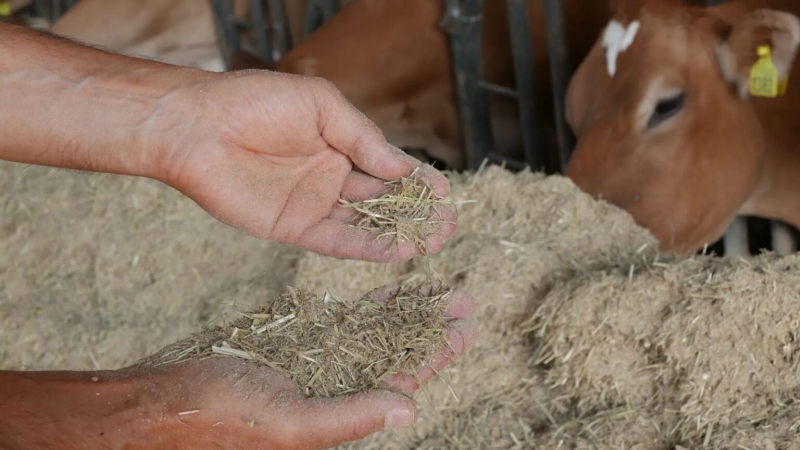Perfect Blend? Here Are The Mistakes to Avoid

Luca Zolin - Coltelli Unifeed Administrator - is ready to share some valuable tips and tricks you can put into practice to make the perfect blend for your herd.
Are you sure you are offering your cattle the perfect blend?
In the past few weeks, on a day like any other, I happened, walking among the stables and livestock farms in my area, to observe with a sharp gaze, trained by a lot of experience, cattle feeding the Unifeed ration.
The animals would "choose" what to swallow: with their tongues they would go for the part of the mixture they liked - by taste or smell - setting aside the less appetizing part.
And it was experience that taught me that this happens when the mixture is not homogeneous.
Through a closer look I was able to notice, in fact, that the forage part of it was particularly crumbled.
The straws were not with the usual tubular structure, 2-3 cm long, solid and recognizable, most of them were frayed and shredded.
The mixing operator then confirmed to me that he had recently noticed that mixing times had become long and that the amount of ration left in the feeder by the animals had increased.
Faced with these statements, I could not help but point out to him the state of the knives attached to the augers and listen to his reaction of amazement, "But how! I remember well when they were changed: it's not that long!"
Here we go again, I thought to myself.
Expensive, technological, demanding, powerful and capable machines... that don't work well because of some small detail.
It happens more often than you think.
The secret to the perfect blend
Cattle are picky and demanding customers. If the ration they find available in the feedlot is not okay there will be consequences.
In particular, the forage component of the mixture is delicate. It is this in fact that, once it reaches the rumen with the first chew, triggers regurgitation to the mouth where fine chopping takes place, ready for actual digestion.
At that point the food is transformed into energy and then into milk or growth.
The secret is all in the chopping and mixing.
All too often these steps are underestimated, the knife applied to the augers is not considered in its importance and delicate function in relation to the quality of mix produced.
All the aspects you cannot overlook
Coltelli Unifeed approached this issue from two perspectives: the first related to materials and the second related to form.
The choice of materials
The issue of materials is a priority. The efficiency of a knife must be protracted over time, fully performing its function of cutting the long fibers inserted in the hopper.
A knife with a worn cutting part generates significant negative effects: the mix produced is not optimal for feeding the herd, with even eloquent drops in production.
Mixing times lengthen, increase:
- Fuel consumption and machine stress
- The time spent by operators
Finally, farm management results deteriorate.
The choice of shape
The shape of the knife also makes a difference: whether the cutting part is curved or flat is not irrelevant.
Repeated tests in several plants, on machines of different manufacturers and in the presence of more or less tenacious forages have given clearly indicative results. A flat-cut blade is more efficient, cuts sharper and mixes components more evenly.
The Coltelli Unifeed solution
Coltelli Unifeed has developed a knife that will allow you to get the perfect blend for your farm.
I am referring to the Coltello art. 310 Lucagri _ al Tungsteno with the following features: 8 mm instead of 5, no need for an under-blade, guaranteed long life.
The knife is made of high-performance steel especially in the cutting part that acts sharply on the fibers and does not cause crumbling of forages.
Usage tests show an important reduction in the time needed to reach the optimal mix.
Finally, an important aspect, the Coltello art. 310 Lucagri is suitable for mixers of almost all brands.
Would you like to find out more?
For any needs do not hesitate to contact us, we are at your complete disposal.
